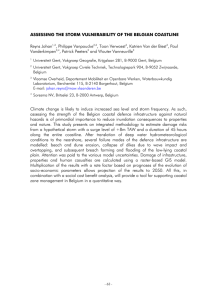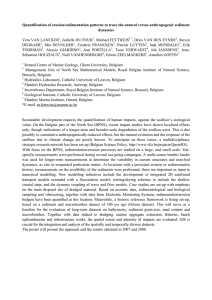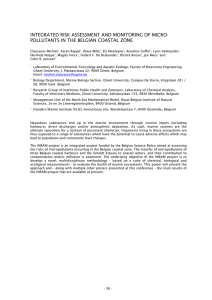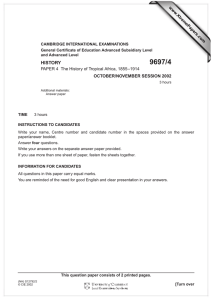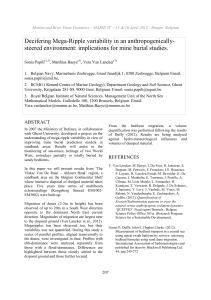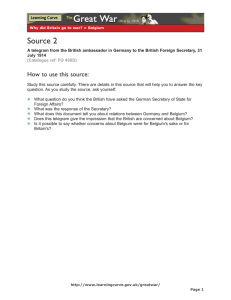9697 HISTORY MARK SCHEME for the October/November 2013 series
advertisement
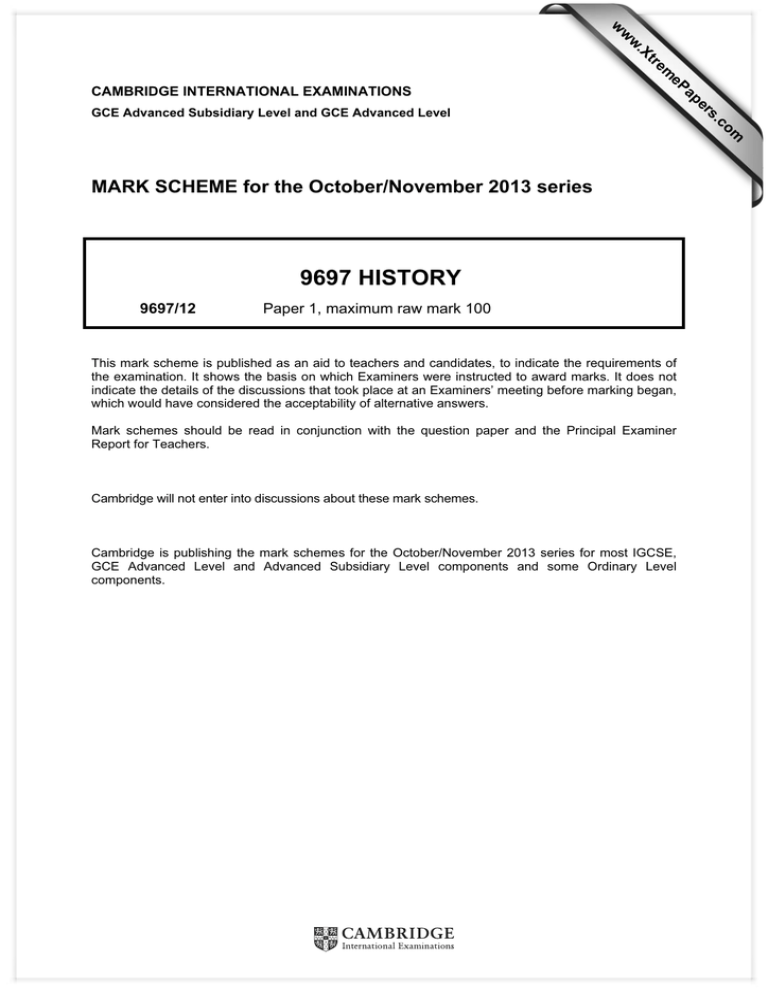
w w ap eP m e tr .X w CAMBRIDGE INTERNATIONAL EXAMINATIONS 9697 HISTORY 9697/12 Paper 1, maximum raw mark 100 This mark scheme is published as an aid to teachers and candidates, to indicate the requirements of the examination. It shows the basis on which Examiners were instructed to award marks. It does not indicate the details of the discussions that took place at an Examiners’ meeting before marking began, which would have considered the acceptability of alternative answers. Mark schemes should be read in conjunction with the question paper and the Principal Examiner Report for Teachers. Cambridge will not enter into discussions about these mark schemes. Cambridge is publishing the mark schemes for the October/November 2013 series for most IGCSE, GCE Advanced Level and Advanced Subsidiary Level components and some Ordinary Level components. om .c MARK SCHEME for the October/November 2013 series s er GCE Advanced Subsidiary Level and GCE Advanced Level Page 2 Mark Scheme GCE AS/A LEVEL – October/November 2013 Syllabus 9697 Paper 12 GENERIC MARK BANDS FOR ESSAY QUESTIONS Band Marks Levels of Response 1 21–25 The approach will be consistently analytical or explanatory rather than descriptive or narrative. Essays will be fully relevant. The argument will be structured coherently and supported by very appropriate factual material and ideas. The writing will be accurate. At the lower end of the band, there may be some weaker sections but the overall quality will show that the candidate is in control of the argument. 2 18–20 Essays will be focused clearly on the demands of the question but there will be some unevenness. The approach will be mostly analytical or explanatory rather than descriptive or narrative. The answer will be mostly relevant. Most of the argument will be structured coherently and supported by largely accurate factual material. The impression will be that a good solid answer has been provided. 3 16–17 Essays will reflect a clear understanding of the question and a fair attempt to provide an argument and the factual knowledge to answer it. The approach will contain analysis or explanation but there may be some heavily descriptive or narrative passages. The answer will be largely relevant. Essays will achieve a genuine argument but may lack balance and depth in factual knowledge.Most of the answer will be structured satisfactorily but some parts may lack full coherence. 4 14–15 Essays will indicate attempts to argue relevantly although often implicitly. The approach will depend more on some heavily descriptive or narrative passages than on analysis or explanation, which may be limited to introductions and conclusions. Factual material, sometimes very full, will be used to impart information or describe events rather than to address directly the requirements of the question. The structure of the argument could be organised more effectively. 5 11–13 Essays will offer some appropriate elements but there will be little attempt generally to link factual material to the requirements of the question. The approach will lack analysis and the quality of the description or narrative, although sufficiently accurate and relevant to the topic if not the particular question, will not be linked effectively to the argument. The structure will show weaknesses and the treatment of topics within the answer will be unbalanced. 6 8–10 Essays will not be properly focused on the requirements of the question. There may be many unsupported assertions and commentaries that lack sufficient factual support. The argument may be of limited relevance to the topic and there may be confusion about the implications of the question. 7 0–7 Essays will be characterised by significant irrelevance or arguments that do not begin to make significant points. The answers may be largely fragmentary and incoherent. . © Cambridge International Examinations 2013 Page 3 Mark Scheme GCE AS/A LEVEL – October/November 2013 Syllabus 9697 Paper 12 Section A: Source-Based Question ‘Germany was the guilty party in the Belgian crisis in 1914.’ Use Sources A–E to show how far the evidence confirms this statement. A CONTENT ANALYSIS [L2–3] EVALUATION [L4–5] CROSS-REF TO OTHER PASSAGES OTHER [e.g. Contextual knowledge] Message from the Belgian Foreign Minister to Belgian ambassadors in Europe. Belgium has been careful to preserve its neutrality. It will not do anything to cause distrust among other countries. Y – The source is intended to give an accurate view of Belgium’s position. Y – D agrees about the unjustified actions by Germany. Y – Belgium’s reliance on treaties for safety was important. N – B contradicts A because it justifies German action, as does D. Candidates can explain further the international implications of Belgian independence. They are not expected show knowledge of Belgian internal developments. Y – Belgium did not join either of the major alliances. Y/N – A does not mention any specific country presenting a problem to Belgium and there is nothing to agree directly or indirectly with C. © Cambridge International Examinations 2013 Page 4 B Message from the German government to Belgium via the Dutch. Mark Scheme GCE AS/A LEVEL – October/November 2013 Germany regrets its invasion of Belgium. The invasion was justified because of French military action. Germany had no intention of making permanent gains in Belgium. Y – The message itself is very probably an accurate transcription of the message from the German government. Y – Germany probably did not have long-term intentions to hold on to Belgian territory. Syllabus 9697 Paper 12 Y – D agrees about Germany’s reasons for the Belgian invasion. N – A denies any justification for an invasion. Reasons for German intervention can be explained in terms of its war plans e.g. Schlieffen Plan. French military preparations can be examined. N – C contradicts all other sources about the German invasion. N – Germany was breaking international agreements. Y/N – Was Germany reacting to a French threat? C Article in an Irish nationalist / Marxist newspaper. Britain was responsible for Belgium’s plight. N – The provenance is very revealing about the reliability of the source. N – This source takes a very different view from all other sources. N – Belgium might have been unwise to rely on promises of nonintervention but it was hardly stupid. N – British diplomacy might have been unclear but was Britain cunning and heartless? © Cambridge International Examinations 2013 Candidates are not expected to show knowledge of Anglo-Irish affairs beyond what is indicated in the provenance. Page 5 D Justification of Germany’s action by the German Chancellor. Mark Scheme GCE AS/A LEVEL – October/November 2013 Only necessity caused Germany’s invasion of Belgium. Germany did what Britain considered doing in 1911. Y – Germany believed that an invasion of Belgium was necessary for national security. Y – The quotation from Bethmann-Hollweg is probably accurate. N – The source is very subjective, defending Germany after it lost the war. Syllabus 9697 Paper 12 Y – B agrees that Germany was forced to invade Belgium. Y – C makes a different case, that German was no worse than Britain. The discussion of British attitudes to Belgium might include the importance of Belgian independence to Britain’s position. N – A maintains that all countries promised to recognise Belgian independence. Y/N – The reference to British plans might, or might not, be accurate. E Lloyd George explains British war aims. Germany had broken international agreements by its invasion of Belgium. Y – The invasion of Belgium was a decisive factor in taking Britain to war. Y – A there is a clear if indirect link and agreement between the sources. N – The source is not objective. N – B contradicts Lloyd George. N – C is a strong rejection of E. N – D disagrees and accuses Britain of harbouring plans for a Belgian invasion. © Cambridge International Examinations 2013 Candidates might discuss whether it was a war of defence by Germany. They might examine British views about the outcome of the invasion. Page 6 1 Mark Scheme GCE AS/A LEVEL – October/November 2013 Syllabus 9697 Paper 12 Source-Based Question L1 WRITES ABOUT THE HYPOTHESIS, NO USE OF SOURCES [1–5] These answers write generally about the causes of the 1914 war but will ignore the question, i.e. they will not use the sources as information / evidence to test the given hypothesis. For example, they will not discuss ‘Germany was the guilty party in the Belgian crisis in 1914’ but will describe events very generally. Include in this level answers which use information taken from the sources but only in providing a summary of views expressed by the writers, rather than for testing the hypothesis. Alternatively, the sources might be ignored in a general essay answer. L2 USES INFORMATION TAKEN FROM THE SOURCES TO CHALLENGE OR SUPPORT THE HYPOTHESIS [6–8] These answers use the sources as information rather than as evidence, i.e. sources are used at face value only with no evaluation / interpretation in context. For example; ‘The hypothesis that Germany was the guilty party in the Belgian crisis in 1914 is challenged in Sources B and D. Source B shows that Germany regretted having to invade Belgium. It was forced to do so in order to protect itself against French armies. Germany had no intention of making permanent gains from its invasion. Belgium itself was not an enemy. Source D confirms this. It agrees with B that it was forced to invade Belgium and was willing to compensate Belgium. Furthermore, its actions were no different from what Britain planned to do before the war. L3 USES INFORMATION TAKEN FROM SOURCES TO CHALLENGE AND SUPPORT THE HYPOTHESIS. [9–13] These answers know that testing the hypothesis involves both attempting to confirm and to disconfirm it. However, sources are used only at face value. For example; ‘On the other hand, a group of sources reject the hypothesis either directly or indirectly. Source E shows clearly the effect of Germany’s unjustified invasion of Belgium on international relations. It broke promises that Germany, among other countries, had made to preserve Belgian independence. Source A explains Belgium’s reliance on these promises and the reasons why it mobilised its army. Source C argues that Britain was responsible for the Belgian crisis and does not mention directly Germany’s participation.’ L4 BY INTERPRETING / EVALUATING SOURCES IN CONTEXT, FINDS EVIDENCE TO CHALLENGE OR SUPPORT THE HYPOTHESIS. [14–16] These answers are capable of using sources as evidence, i.e. demonstrating their utility in testing the hypothesis, by interpreting them in their historical context, i.e. not simply accepting them at face value. For example; ‘The claim that Germany was the guilty party in the Belgian crisis in 1914 can be accepted if we look at the evidence in the sources. Source A is a reliable account of Belgium’s position. It had remained outside the Triple Alliance and the Triple Entente. Although Lloyd George spoke as a leading enemy of Germany in Source E, his explanation of British attitudes can be accepted. Germany was more aggressive than Britain in 1914 and it was Germany that invaded Belgium. International treaties and other agreements for almost a hundred years guaranteed Belgian independence and neutrality and these were discarded by Germany.’ © Cambridge International Examinations 2013 Page 7 Mark Scheme GCE AS/A LEVEL – October/November 2013 Syllabus 9697 Paper 12 L5 BY INTERPRETING AND EVALUATING SOURCES IN CONTEXT, FINDS EVIDENCE TO CHALLENGE AND SUPPORT THE HYPOTHESIS. [17–21] These answers know that testing the hypothesis involves attempting both to confirm and disconfirm the hypothesis, and are capable of using sources as evidence to do this (i.e. both confirmation and disconfirmation are done at this level). For example (L4 plus); ‘Another group of sources denies the claim that Germany was the guilty party in the Belgian crisis in 1914. Source B explains the reasons for the invasion from the German point of view and underlines the danger to its security from France. Reference can be made to the role of the Schlieffen Plan. Germany’s explanation is supported by Source D. Source C is very hostile to Britain but it still makes the valid point that Belgium was not the only reason why Britain went to war against Germany.’ L6 AS L5, PLUS EITHER (a) EXPLAINS WHY EVIDENCE TO CHALLENGE / SUPPORT IS BETTER / PREFERRED, OR (b) RECONCILES / EXPLAINS PROBLEMS IN THE EVIDENCE TO SHOW THAT NEITHER CHALLENGE NOR SUPPORT IS TO BE PREFERRED. [22–25] For (a), the argument must be that the evidence for challenging or supporting the claim is more justified. This must involve a comparative judgement, i.e. not just why some evidence is better, but why some evidence is worse. For example; ‘The best source that confirms the claim that Germany was the guilty party in the Belgian crisis in 1914 is Source A. This is a clear and dignified explanation of Belgian independence and neutrality. This had been confirmed by major countries including Germany. Whatever the excuse, Germany therefore broke its international undertakings and responsibilities. The claim in Source B that Germany would evacuate Belgium, presumably when it won the war, does not invalidate the hypothesis. Both Sources D and E have the weakness that they are not objective but Source E is better evidence of what Germany had done. Source C can be dismissed because it is too one-sided.’ OR ‘The best conclusion is that the judgement is inconclusive because the arguments are equally balanced. Source B counters Source A in its account of German policy and Sources D and E balance each other in their accounts of the views of two leading politicians from opposing sides. Source C seems to swing the blame against the hypothesis but it can be given little weight. It is not a reasoned argument and is based on prejudice, not evidence.’ For (b) include all L5 answers which use the evidence to modify the hypothesis (rather than simply seeking to support / contradict) in order to improve it. For example; ‘The hypothesis can be modified. Germany was mostly the guilty party in the Belgian crisis in 1914. It took the decisive step to break its promises and invade Belgium. This was done deliberately and was part of Germany’s war plans that had been drawn up many years before. On the other hand, a war on two fronts would probably destroy Germany unless it first dealt with France and this would only be possible if Germany attacked France through Belgium. French defences on its border with Germany were very strong. British politicians, especially Grey the Foreign Minister, made general references to Belgium but could have made it clearer that invasion would lead directly to war unless Germany withdrew immediately.’ © Cambridge International Examinations 2013 Page 8 Mark Scheme GCE AS/A LEVEL – October/November 2013 Syllabus 9697 Paper 12 Section B 2 Assess the aims of the French revolutionaries in 1789. There is no specific start date because the origins of the grievances of the French revolutionaries were earlier than 1789. The cahiers of the Third Estate embodied the main aims that might be discussed. They called for an end to royal absolutism and the influence of unpopular ministers. There was a call for individual liberties which would end despotic practices such as the lettres de cachet. Demands were made for a constitution to define government, implying a limited monarchy. There were calls for regular meetings of national assemblies but this did not mean democracy in a modern sense. They called for the liberty of press and publications. Very good answers might point out that many of these demands were supported by the other Estates. Much attention was given to economic changes, especially fiscal. The burden of taxation, especially indirect taxes, was too heavy on the Third Estate. Internal customs duties were especially unpopular with the middle classes. The peasantry were not as affected as trading groups and those who depended on wider trading circles. Central control of economic affairs was felt to be unfair on the needs of different provinces. Responses can use such points to explain their background. For example, Louis XVI was despotic but weak. He was well-meaning but unwilling to confront powerful reactionary interests. The Church and nobility were unwilling to give up their privileges. The parlements were regional assemblies but preoccupied with their own rights and did not represent the assemblies that were sought in 1789. Liberty of publication reflected particularly the concerns of those who were affected by the Enlightenment. The fiscal system had fallen into disrepute partly because of the influence of tax-farmers. The costs of war, especially the Seven Years’ War and the War of American Independence, emptied the treasury. The royal family was believed to be an unreasonable burden on the finances. Poor harvests in the 1780s caused hardship and added to inflation. They were not the responsibility of the King but they added to the grievances of the lower orders. 3 ‘The Industrial Revolution benefited the working classes in the nineteenth century.’ How far do you agree with this claim? (You should refer to at least two of Britain, France and Germany in your answer.) The key issue is the extent of the benefits (and by implication the problems) to the working class from the Industrial Revolution. Historians are divided on the issue. Responses should refer to at least two of three specified countries. On the positive side, the Industrial Revolution led to a greater availability of food, especially because of better communications. The poor depended less on local supplies, which might fail. Famine generally ended. Transport made for more employment, directly and indirectly. Health and average life-spans also improved because of better medicines. Other social improvements came with wider education, patchy and limited at the beginning of the century but more open to the lower classes by the end of the nineteenth century. Governments introduced Factory Acts to alleviate the worst effects of industrial employment. In the long term, housing improved. The negative effects were more evident in the short term. Old trades and methods of working disappeared, causing unemployment. Rural life was dislocated and unemployment was widespread, forcing many to migrate to towns. Housing in towns were usually in slum conditions and disease spread. The working class was exploited by employers with an increase in popular unrest. Self-employment which had been common in preindustrial societies was far less so. Gradually, the masses began to exert influence on the political and economic governors. Trade unions established themselves by the end of the nineteenth century. An extension of the franchise was slow but it was much wider by the end of the nineteenth century (especially from 1867 and 1884 in Britain). Real wages increased, allowing the working class to buy more than the basics. The increase was uneven. There were periods of slump but the overall picture seemed to be encouraging. © Cambridge International Examinations 2013 Page 9 4 Mark Scheme GCE AS/A LEVEL – October/November 2013 Syllabus 9697 Paper 12 Evaluate Mazzini’s contribution to the unification of Italy. Assessing Mazzini’s contribution involves more than offering a description but includes a study of his success and failure and links with the final outcome of unification. He can be regarded as a success because he was the earliest prominent nationalist and inspired many. Even those who disagreed with him and ultimately succeeded in unifying Italy had to come to terms with his influence. He might be regarded as a failure because his revolutionary efforts did not achieve their objectives. Italy became united but under a monarchy, not a republic. He himself regarded the new Italy as a failure. Mazzini died in 1872 but answers might argue that his most important work finished in 1849. Mazzini spent his adult life working for his cause of Italy. He formed Young Italy to unify the country. His belief that Italy should unify itself, without foreign assistance, showed his determination but proved a mistake. He was a revolutionary and not a diplomat. He wished to unify different social classes in the cause, a difficult task in a country that was very socially divided. Risings in the 1830s were abortive and he had to spend years in exile gaining an international reputation but limiting his influence in Italy. The revolution in 1848–49 marked the climax of his career. With Garibaldi, he set up the Roman Republic, valiant but a failure after a two-month siege that was put down by France. Rome represented the capital of a new Italy to Mazzini but Catholics saw it as the centre of the Church and the attack harmed Mazzini’s reputation as a national leader. The rest of his life was spent out of the limelight. Responses might explain his influence on Garibaldi, who shared many his views and returned from exile to play a vital part in unifying Italy. A study of Cavour should be linked to Mazzini, mostly as a contrast in aims and methods but also to show how Cavour was persuaded to go further than his original intention to create a larger Piedmont in the north. 5 How similar were the problems that faced European imperialists in Africa and Asia in the late nineteenth century? (You should refer to at least two of Britain, France and Germany in your answer.) The key issue is the comparative difficulty of establishing European empires in Africa and Asia and it is is important to refer to some specific European countries. The best answers will contain a clear comparative element and are likely to have a reasonable balance between Africa and Asia. Answers can be structured sequentially as long as they make sound points of comparison. Problems might include the presence of rivals. This applied to some parts of Africa and some areas of China and the Far East. Examples might be used from the Sudan and Hong Kong / Korean region. Another factor might be the hostility of the indigenous population in some parts. The Mahdi led a dangerous revolt in Egypt and the Sudan. The Zulus were a major problem to the British in South Africa. The Chinese Boxer Rebellion (1900 but acceptable) was a danger to European expansion. Differences might be the strength of indigenous governments. China presented a much bigger problem than African tribes. Disease was a problem in some parts of Africa and Asia but variable in its extent, even when quinine was developed. The use of steamships facilitated travel to Africa and Asia but the penetration of the interiors was problematic. 6 Why was the February 1917 Revolution a more serious danger to Nicholas II than the 1905 Revolution? The key issue is the comparison of the 1905 and February Revolutions in Russia. Answers can be organised sequentially but such answers should make valid points of comparison to merit a high mark. 1905 was the most serious anti-tsarist rising to that point in Nicholas II‘s reign. It marked the culmination of unrest by the peasantry and urban workers who were hit hard by inflation, poor wages and desperate social conditions. This was broadly similar to the situation in 1917 except that conditions were worse. War was a common factor. Defeat in the RussoJapanese War (1904–05) was a blow to the prestige of Nicholas II and his regime. The © Cambridge International Examinations 2013 Page 10 Mark Scheme GCE AS/A LEVEL – October/November 2013 Syllabus 9697 Paper 12 consequences of World War I had much greater effects on the reputation of the government. Bloody Sunday (1905) in St. Petersburg involved a cross-section of the middle and lower classes. Disorder spread to many parts of the country. The February 1917 Revolution also began in St. Petersburg. However, there were striking differences. In 1905, the army was loyal. The army’s actions led directly to the massacres that characterised the revolution. In 1917, the army was no longer loyal. Military defeat and causalities, economic hardship and the links between ordinary soldiers and the dissatisfied provinces changed soldiers’ attitudes. It can be argued that Nicholas II’s roles were both similar and different. He was not personally responsible for Bloody Sunday but he presided over the system that made it possible. He was held more responsible in 1917. World War I exposed the faults in the system and his own shortcomings. He was an ineffective military leader and left government to Tsarina Alexandra and Rasputin. In 1905, there were efficient ministers such as Witte and Stolypin who could help to retrieve the situation. There was nobody in 1917. In 1905, he promised reforms through the October Manifesto. This gave him some leeway, although he soon revealed his true policies in the Fundamental Laws and treatment of the Dumas. By 1917, it was too late to promise reforms and they would not have been trusted. Although the communists did not play a major role in February 1917, the activities of radicals were more influential than in 1905. 7 Assess the claim that Mussolini’s only consistent aim as ruler of Italy to 1939 was the preservation of his personal power. The key issue is Mussolini’s aims. It is possible to agree with the statement in the question that his only consistent aim to 1939 was to preserve his personal power but better responses may see some limitation in the claim. Fascism itself was an extreme right-wing and totalitarian programme but it was less defined than communism and Nazism. Mussolini moved from a radical left-wing position as editor of the socialist ‘Avanti’ newspaper. He later contradicted his early support for workers’ rights and a call for an end to property rights. The common factor of Fascism in several countries was the supremacy of the state. Having been appointed Prime Minister (1922), he soon gained sole control as Duce. The moderate opposition withdrew in the Aventine Secession. Other political parties were banned. Italy became a single constituency in elections where the candidates were nominated by the Fascist Grand Council, in theory controlled directly or indirectly by Mussolini. Propaganda gave the impression that Mussolini was at the heart of everything. The reality was different. He was less dominant in the Fascist party than Hitler in Germany and certainly Stalin in communist Russia. Other Fascists often acted independently, although paying lip-service to Mussolini. Local officials were appointed by Mussolini but sometimes he had little choice. The courts enhanced his personal authority but the opposition, whilst curbed, was not treated as harshly as in Germany and Russia. He was careful to be respectful to King Victor Emanuel III. He made a compromise agreement with the Papacy that recognised the popularity of the Roman Catholic Church in Italy. His aim was to put his personal stamp on the economy. There were ambitious public works and ‘battles’ for economic and social improvement. In practice, they had limited success as Mussolini often pursued different and contradictory methods. In foreign affairs, he wished to enhance Italy’s greatness through war but also sold himself as a diplomat who could bring peace to Europe. 8 Why did the peasantry remain a significant problem for Tsarist and Communist rulers of Russia to 1939? The key issue is the continuing problem of the peasantry for Russian governments. They comprised a large proportion of the population, perhaps three-quarters. They were dissatisfied with their conditions but, at the same time, opposed to change. The reforms of Alexander II freed them from some burdens but their living conditions were poor. There was extensive poverty and frequent food shortages. Redemption payments were a heavy burden. The 1905 Revolution was accompanied by widespread peasant disorder. The police and army found it more difficult to © Cambridge International Examinations 2013 Page 11 Mark Scheme GCE AS/A LEVEL – October/November 2013 Syllabus 9697 Paper 12 discipline the peasantry than urban workers who were a more cohesive group. Stolypin worked to improve conditions by encouraging a kulak class. He also encouraged migration to virgin regions such as Siberia. There was some limited improvement by 1914. Politically, the peasantry were conservative but this was not necessarily a strength for tsarism because most refused to cooperate with government policies. The reputation of Nicholas II was shaken in the 1905 Revolution. The hardships of the war years from 1914 produced a peasant backlash that was an important cause of the downfall of Nicholas II. As well as higher taxes and falling food supplies for the civilian population, most ordinary soldiers were of a peasant background and came to share the grievances of their fellow class members. Lenin gave less priority to support from the peasantry than to the urban proletariat. They remained a problem for him when large groups, not persuaded by Bolshevism, joined the Whites in the Civil War. They resisted War Communism that attempted to enforce new methods in the agricultural economy. Lenin took a step backwards in the New Economic Policy (1921). Stalin used brutal methods against the peasantry. Collectivisation was intended to improve the national economy but it would also tame the peasantry. Millions suffered from famine and transportation to distant regions. Yet Russia did not develop modern agriculture, in spite of widespread propaganda to the contrary. Responses may note that peasants belonged to different racial groups and handling this was a problem for all governments. © Cambridge International Examinations 2013
